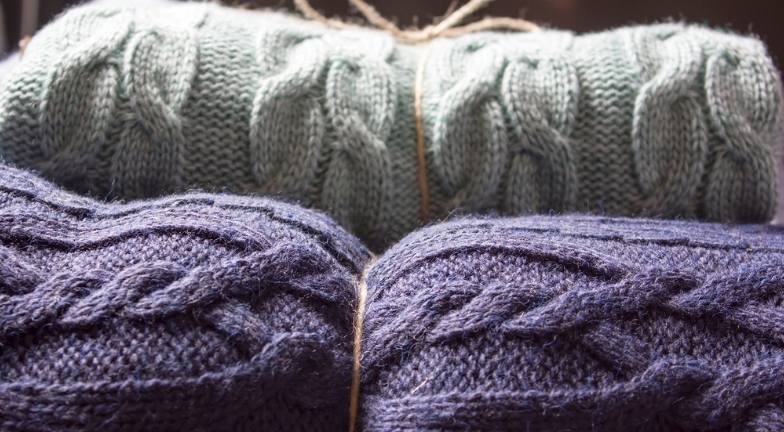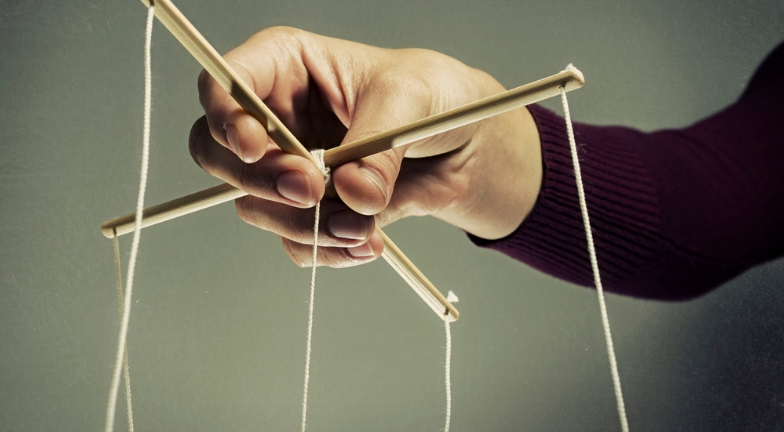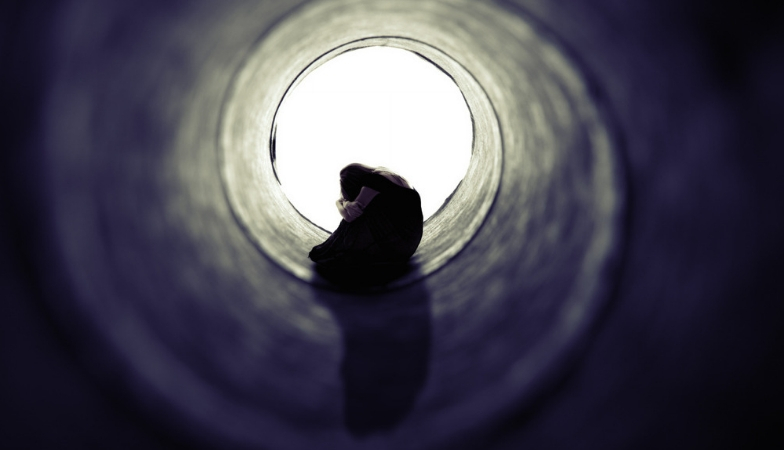Vivian McGrath was pregnant when her partner wrapped his hands around her neck and tried to kill her. Then she went back to him. After finally escaping this abusive relationship and having found love again, she has well-earned advice
Leaving an abusive man was one of the toughest things I’ve ever done in my life. Had I not left I would almost certainly now be dead.
I was 22 and 7 months pregnant when my ex-husband wrapped his hands around my throat and ordered me to ‘die, you c**t, die’!
On my last breaths of air and with no strength left to fight, I begged for my life. It was a rasping, horror-film sound, but it was my mine. I knew I was about to die.
I know now that if you have been strangled by your partner even once, the odds of them killing you go up to 750 per cent. I’m lucky to be alive.
I went back to him just before my baby was born. It sounds incredible, I know. To someone who has never been in an abusive relationship. The pull back to him was intense. I tried to leave many, many times. When I finally found the strength and courage, it hurt like hell.
I went back to him just before my baby was born. It sounds incredible, I know
This is because I equate loving abusive partners to a form of drug addiction and withdrawal from them is painful. It took me a long time to even realise I was in an abusive relationship. It can be confusing, particularly in the absence of any physical violence.
Emotional or psychological abuse is also known as coercive control. It’s an effective form of brainwashing and in the UK is now a crime. It can include social, financial and emotional abuse even if violence is not present.
We are groomed by an abusive partner and tested to see if we are someone they can manipulate and control.
If so, then they gradually increase that abuse incrementally. We’re like a frog in boiling water. We don’t always realise we’re being abused until it’s too late and too hard to leave them because they have isolated us from friends and family and slowly, but surely taken over control of our lives.
So, it’s worth knowing the signs of an abusive relationship, it will help you identify if you are in one.
Narcissists and abusive types can be charismatic and persuasive people. I didn’t fall in love with a violent man – I fell in love with a charming guy who later turned violent. There’s a big difference.
Although they can sweep you off your feet, for abusive people it’s about control, not love.
They use manipulative tactics to gain control over you and you may not even be aware it’s happening. Here are some of the signs to look for followed by emotions to expect when you leave (from someone who has been there).
Projecting
Abusers project their negative and toxic behaviour on to you. They’ll say you’re the one who’s fibbing when they’re lying through their teeth. They’ll accuse you of having affairs when it’s they who are being unfaithful to you. This is one way they shift the blame for their behaviour onto you.
Gaslighting
Gaslighting is a tactic used by abusers to make their victims question their reality. They do this by denying, shifting blame and often saying things that did happen didn’t or vice versa. For example, in the movie Gaslight (1944), a man manipulates his wife – denying her what she believes is the truth – to the point where she thinks she is losing her mind.
Gaslighting is aimed at distorting your sense of reality. It stops you from questioning a narcissist’s abusive behaviour, by eating away at your ability to trust your own judgement.
If we question their behaviour, they dismiss it, telling us we’re too sensitive or we are exaggerating what happened. ‘You imagined it. You exaggerate. That never happened.’ That kind of behaviour over months and years makes you question yourself and wonder, ‘Maybe it’s me, maybe I’m the crazy one.’
Soon after any abuse happens, they’re all charming again. They’re convincing you whatever it was they did wasn’t as bad as you thought.
You question yourself again: ‘did that really happen the way I thought it did?’
You feel like you are going crazier. In a way, you are because they are making you that way. But the constant blame-shifting makes you start to think you must have caused it and as a result you change your behaviour instead. That’s what they need to get away with their actions.
Circular conversations
Abusers drag you into twisted, circular conversations. If you raise something you’re unhappy with or question anything, they’ll throw up a smoke bomb – in the form of a crazy line of argument
In fact, if you want a sure sign you’re with an abusive narcissist, try bringing up any behaviour of theirs you find difficult to deal with.
They cannot stand having a mirror put up to their flaws and will always lash out at you, blaming you for making them that way, or not helping them stop being that way or for something you did that made them behave the way they did. But their behaviour is not your fault. It is theirs.
This is the pattern: what starts as a benign comment from you will turn into a personal attack on you, your friends, your family, your entire belief system. If you are able to call them up on a certain point, they’ll then lead you down another crazy line of reasoning.
I remember thinking I was going mad when I got sucked into those types of conversations with my ex. I couldn’t make sense of them. You can’t defend or argue against illogic. There is no rationale to it. In their minds, they are simply always right and there is nothing you can do to make it otherwise.
Circular conversations are yet another way for them to blame you. You’ll get so far away from the original comment – which was you drawing attention to their bad behaviour – it ends up lost in the wash.
Blanket statements
They also make blanket statements. My ex told me ‘you’re a spoilt brat. You grew up with a silver spoon in your mouth’. You may hear ‘you’re impossible to please’ or ‘you’re just selfish’. They’ll put words in your mouth, saying things like ‘so, you’re saying you’re the perfect one now?’
With such blanket statements, abusers showing you they can smash through any argument you can come up with. Anything to avoid accepting the blame for their behaviour.
Shifting the goal posts
Narcissists set these unwritten rules for you that they don’t have to abide by. But, the problem is you can never live up to them because just when you think you understand what the rule is and how to abide by it to keep them happy, they’ll move the goal posts and come up with a new rule, based on some other behaviour of yours that you have to change. Trust me, you will never win this game.
It’s about attacking your weakness – one perceived by them – not praising your strengths. By keeping you on the back foot, constantly walking on eggshells to ensure they don’t lash out because of your behaviour, abusers remain in control. It’s designed to encourage and instil in you the sense you are unworthy. And also, to make you afraid to question them.
Threats
Abusers may threaten to cut off any finances or threaten you with violence If you’ve ever heard them say ‘if I can’t have you, no-one can,’ or ‘you’re not getting out of this that easily,’ be wary.
They are broadcasting to you they are capable of killing you. If they threaten suicide, they may kill you and then themselves. I’d take seriously any threats like these.
Negative brainwashing
Narcissists will brainwash you into associating your strengths, talents and positive memories with abuse and frustration.
They’ll turn a job promotion into a negative attack on your ‘ambition’, take positive memories like Christmases, birthdays or going out with your friends and sabotage them.
They do this by causing a massive argument or a scene, often over some tiny misdemeanour that broke one of their rules. They’ll say you’re selfish, for spending a weekend with relatives, not them. Even if you take time out to mourn someone you loved who has passed away, they will find a way to make your behaviour wrong.
This is their way of isolating you from family and friends – anyone who may be a safety net for you and tell you, you deserve better than them.
Smear campaigns
They may wage a smear campaign against you. Especially, if they sense they’re losing control over you or over how you see yourself.
If they see you’re getting what they’re saying about you wrong, they’ll turn to others to back them up, convince other they’re the victim and that you’re the crazy one, not them. They may spread rumours about you, especially if you try and leave.
Triangulation
They’ll bring others into your relationship, to put you off balance. The hint of someone they might have an affair with, to instil fear in you they might leave you. Or someone they can use to say to you ‘you see, (that person) agrees with me, you’re crazy!
Intimacy as a weapon
They’ll use intimacy as a weapon against you. What you share with them when they’re all loving and kind, they’ll throw back at you later, to hurt you.
Being vulnerable with each other is the only way to build trust – in a healthy relationship you can do this. But a narcissist will use this information as a barb to weaken you.
They may also withold sex or use the silent treatment as a way to punish you.
Hoovering
After any abuse, a narcissist will suck you back in, especially if you go to leave them.
They’ll cry and promise to change. They’ll tell you ‘no-one will ever love you as much as I do, I need you now more than ever’.
It’s so alluring because you also get that beautiful loving side of them again. It’s difficult to remain angry, so you forgive them.
Testing your boundaries
Narcissists will test the waters over what boundaries you have and whether they are strong or weak. They will push and push and push until you lash out and then point at you as the ‘crazy one’.
In the beginning, they love-bomb you and suck you into the relationship with their charisma. Once they feel they have you, they’ll test your boundaries. If they get away with it, they’ll test again.
My ex pushed me hard against a wall, but it was so quick and then it was over. I didn’t walk away. I believed him when he said he was sorry, I forgave him and accepted that first sign of violence. Without realising, I gave him permission to push my boundaries again. He did and the abuse only got worse.
If you recognize any of these in your relationship I would urge you to get help and support.
These tactics are manipulation, pure and simple. They will confuse you and destabilize you. They’ll lead you to mistrust your gut instincts and crush your self-esteem. You’ll get sucked into an abusive cycle. The longer you are exposed to this brainwashing the harder it will be to leave.
Believe me, I know how hard this is to get away from. I thought leaving an abusive relationship would be the end. It was just the beginning.
Withdrawing from this abusive cycle of manipulation and control needs every ounce of strength and courage you can get. You have it.
For so long I was walking on eggshells, putting my ex’s needs above my own, numbing my feelings and emotions. When I finally left the last time, I felt euphoric, liberated and free at last. It was an incredible high.
But then I crashed hard. Away from the chaos and drama of that rollercoaster of a relationship, I was still for the first time. Emotions I’d never felt before came flooding out. And not all of them pleasant – I want to share those with you now so you know, they’re normal, they’re part of the healing process and if you let yourself feel them, they will pass and you will come out stronger.
8 emotions to expect when you leave
If you have recently left a controlling, emotionally and/or physically abusive relationship, I won’t lie, the next days, weeks and months will be hard. This can be excruciating. It’s like you’re withdrawing from a drug.
This is not the time to look to anyone else to make you feel better
A range of emotions will flood you to the point where, at times, you’ll feel like you’re drowning. It will hurt like hell. And that is when you’ll be at your weakest. That’s when you’ll be tempted to go back to them or straight into someone else’s arms. Whatever you do, please, don’t do either.
Your self-esteem will be at a low point. You are coming out of a relationship where you’ve been riding an emotional roller coaster. This is not the time to look to anyone else to make you feel better. It’s important you stay still with yourself and feel every single emotion, no matter how hard.
There is no easy way of getting around it. It’s going to hurt. And it’s going to hurt a lot. But, I promise you, it’s far better than staying numb.
Guilt
I also had moments where I felt guilt. I still believed he needed me and I feared what would happen to him after I left. It’s hard enough when we feel guilt of our own. But often abusers are good at manipulating other people to believe they are the victim; that we’re the crazy ones.
We also may feel guilty about our children. How they’ve been exposed and affected by the abusive relationship. And we didn’t protect them enough from it.
Intense jealousy
You become obsessed with finding out who they are with, are they sleeping with anyone? It only adds to your feelings of not being good enough and a failure. Perhaps they were only like that with me? If only you had changed X or Y about yourself, the relationship would have been okay?
You may feel anger for the first time
There will be times when anger overwhelms you. How could they have emotionally and/or physically abused me like that? You finally see them for who they really are. How you were used, manipulated, and brainwashed by them. And you’ll feel angry at yourself for being so stupid as to have ignored the warning signs. ’Why didn’t I just walk away’?
You’ll feel loss. It may hit you hard when you realise how much you have lost, including your innocence. Now you wonder who you can trust. Your dreams of a wonderful future together have been shattered.
You shut yourself off, you can’t sleep yet you can barely get out of bed. It’s important to seek professional help if you are experiencing any signs of depression. Or if you are suffering from Post-Traumatic-Stress-Disorder, in which case even little things can trigger you.
Shame
Too often we hide the extent of domestic abuse. We minimise to others and deny to ourselves, just how bad the situation we are in is. There is a deep feeling of embarrassment and shame. Partly, as we believe it is our fault.
You may go into denial
You may feel you deserve this. That you are worthless. You are nobody without them. You may go into denial.
You start to convince yourself that he or (she’s) living a happy life without you. They might even be flaunting a new partner on social media. You feel the need to prove that you’re having a great time too, because then they might want you back? You might go out drinking, partying, having mindless sex, in huge efforts to convince yourself and them that you are okay.
You harbour thoughts of going back to them. (Or you may try to replicate your previous relationship with another abusive one).
Loneliness
There were moments when I wanted to run back to my ex as I felt intense loneliness; the despair in the pit of my stomach when I thought about never seeing him ever again was gut-wrenching. I believed I would never find happiness again, that it was too late for me.
I honestly believed no man would ever love me, particularly when I was only 23 and had another man’s child. I convinced myself that men who would want a girl my age, would want children of their own, not take on a step-child. I was wrong, by the way.
Self-doubt
You go through periods where self-doubt creeps in. Particularly, when you start to go back over old texts or emails and analysing them in minute detail. They really did love and need me, you think. Perhaps I was a bit cold towards them? I exaggerated things, like they say? You may even convince yourself that it was you who ruined the relationship.
You’ll feel like you’re grieving
Thawing out is crucial to recovering from an abusive relationship. In a sense, it’s like going through the stages of grief when you lose someone you love.
First, there’s denial, then sorrow then anger and so on, until there is an eventual acceptance. And you are grieving. The loss of someone you love and the fantasy of what you thought that relationship might be in your head.
Getting through this tunnel of pain, this withdrawal, this thawing out phase is the hardest part. But, once you get passed that stage, your life will change.
If you work through the pain, instead of trying to numb it by going back to them or into another relationship, you limit the chances of your feelings coming back to haunt you later on.
The pain won’t last forever. Time is your best friend.
Be still and face yourself
When I found the courage to leave I was still for the first time in years. I didn’t know then how much I needed that chaos and drama of an abusive relationship to hide from myself.
When you are on that emotional rollercoaster of a dysfunctional relationship you spend your entire time focused on them, putting their needs first. Changing your behaviour in the hope they’ll change theirs.
But this never being still masks your own deep-seated issues. It did mine. Once I was away from the chaos and drama, I had nowhere to hide. I had to face me. I had to ask myself the painful question: why had I stayed after violence, when others wouldn’t have?
I found this frightened little insecure girl who had low self-esteem. One who was terrified of being abandoned.
I couldn’t control the uncontrollable, I couldn’t fix him. But I could change me
But, whilst he was the ‘damaged’ one, whilst my focus was on fixing him, I could deny I needed fixing myself. He ‘needed me’ to save him, nothing wrong with me! It made me feel good. It filled the void I had inside.
If I was in a relationship with a man who needed me, was more damaged than me, he’d never leave me or so I thought! My fear of abandonment was alleviated.
But this is not the basis for a long-term healthy relationship. Leaving an abusive relationship, being still and facing my fears was terrifying. But, it liberated me. I realised that I couldn’t control the uncontrollable, I couldn’t fix him. But I could change me.
I now knew where to start. I had to be still, feel and process the pain. To start to nurture that frightened little girl.
Self-esteem is key. Replacing that hole inside with self-love and showing up for myself first, meant I could now set healthier boundaries. Boundaries are like Kryptonite for narcissists and bullies.
I no longer feared vulnerability as I could trust my gut instincts to protect me. I found love again. A long term healthy relationship. This time with a good man.
Relax and accept what you’re feeling. Be compassionate and caring with yourself.
You’ve got this.
If you have been affected by the issues raised in this piece, please call:
The National Domestic Violence Helpline 0808 2000 247
Find out more about recovery from domestic violence at The Freedom Programme UK
Or email us your thoughts: editor@healthista.com

Vivian has also listed some free and anonymous helplines here: beingunbeatable.com/domestic-violence-resources/
Related Healthista content:
14 signs of emotional abuse in a relationship
Sexual abuse in yoga – the secret we can’t ignore
7 signs it’s time to end your relationship
How to spot a sexual predator – the 8 characteristics
Like this article? Sign up to our newsletter to get more articles like this delivered straight to your inbox.































































